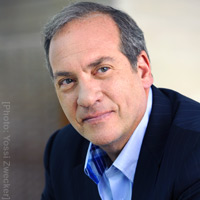Honouring a Great LeaderJanuary 17, 2017 
Dear Friend of The Fellowship, It’s hard to believe that April will mark 49 years since the death of Martin Luther King, Jr. I often wonder what he would think, were he alive today, of the strides we have made towards racial equality – and how he would view the challenges that still exist. Yesterday on January 16th, as we observed Martin Luther King Day, we remembered Dr. King for his pivotal role in the Civil Rights Movement. What is less known – but also well worth remembering – is that Dr. King saw a clear parallel between the struggle of his own people for equality and the struggle of another group familiar with oppression: the Jewish people. John Lewis, a politician who worked side-by-side with Dr. King during the Civil Rights Movement, noted King’s deep understanding of the shared experience of Jews and African-Americans in a 2002 article for the San Francisco Chronicle. Lewis wrote that Dr. King “knew that both peoples were shaped by the tragic experience of slavery. He knew that both peoples were forced to live in ghettos, victims of segregation… King understood how important it is not to stand by in the face of injustice. He understood the cry, ‘Let my people go.’” Dr. King was also a staunch supporter of the modern State of Israel, which was founded during his lifetime. At a 1968 national rabbinical convention, he said, “I see Israel as one of the great outposts of democracy in the world, and a marvelous example of what can be done, how desert land can be transformed into an oasis of brotherhood and democracy. Peace for Israel means security and that security must be a reality.” This strong support was reciprocated by countless American Jews, who were some of the earliest and most ardent supporters of King’s efforts for equality for African-Americans. Jewish organizations offered material, moral, and financial support to the Civil Rights Movement. Members of the African-American and Jewish communities marched together to protest discrimination and, in some cases, even died together doing so. This alliance was and is built on a spiritual foundation, a shared history of faith, born from oppression. It is beautifully illustrated in the old African-American song that became one of the anthems of the Civil Rights Movement – a song that echoes the defiant words Moses spoke to the Egyptian Pharaoh who was responsible for the Jews’ enslavement in biblical times: “Let My People Go.” Dr. King once wrote, “I solemnly pledge to do my utmost to uphold the fair name of the Jews… because bigotry in any form is an affront to us all.” May we remember these words as we reflect on how far we have come in terms of spiritual and racial equality and, considering the strides yet to be made, choose to do our utmost as well as we seek to honour and emulate our God of love and peace. With prayers for shalom, peace, Rabbi Yechiel Eckstein
|
|
|


